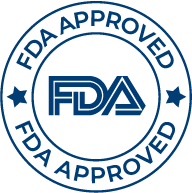Dietary supplements are a popular way to support health and wellness, but many consumers wonder about their safety and regulation. While the FDA (Food and Drug Administration) plays a role in overseeing dietary supplements, their approach differs from that of pharmaceutical drugs.
Dietary supplements are regulated by the FDA as food products, not drugs. This means they are not subject to pre-market approval for safety and efficacy but must meet certain labeling and manufacturing standards. Manufacturers are responsible for ensuring their products are safe and accurately labeled.
In this article, we’ll explore whether supplements can be FDA-approved, if they expire, whether expiration dates are required, and the safety of using old supplements.
How Do I Know If a Supplement Is FDA-Approved?
One common misconception is that dietary supplements must be approved by the FDA before they are sold.
The FDA does not "approve" dietary supplements before they reach the market. Instead, manufacturers must ensure their products are safe and comply with regulations. The [FDA steps][^1] in only when issues arise, such as safety concerns or mislabeling.
To ensure a supplement is safe and high-quality, look for third-party certifications like NSF or USP, which test for purity and accuracy. Checking the label for proper ingredient disclosure and researching the brand's reputation can also help you make informed choices.
How to Identify Safe Supplements
| Indicator | Description |
|---|---|
| Third-Party Testing | NSF or USP certifications |
| Transparent Labeling | Clear ingredient lists and dosages |
| Reputable Brand | Positive reviews and trusted sources |
Do Dietary Supplements Expire?
Like most consumables, dietary supplements have a shelf life.
Yes, dietary supplements can expire, and their effectiveness may decrease over time. Active ingredients, especially vitamins and probiotics, can lose potency after the expiration date. Supplements stored improperly may degrade even faster.
While expired supplements are unlikely to be harmful, they may not provide the intended benefits. It’s important to check the expiration date and store supplements in a cool, dry place to maximize their shelf life.
Common Expiration Indicators for Supplements
| Supplement Type | Typical Shelf Life |
|---|---|
| Vitamins | 1-2 years |
| Probiotics | 6-12 months (requires refrigeration) |
| Herbal Supplements | 1-3 years |
Does the FDA Require Expiration Dates on Supplements?
Expiration dates on supplements can be helpful, but are they mandatory?
The FDA does not require expiration dates on dietary supplements, but manufacturers must provide evidence that their products are stable and meet label claims under proper storage conditions. Many reputable brands voluntarily include expiration dates to reassure consumers about product quality.
When purchasing supplements, prioritize brands that display expiration or "best by" dates. This ensures that the product is fresh and effective.
Is It Safe to Take Old Supplements?
Using expired supplements is not ideal, but is it dangerous?
Taking old supplements is generally safe, but they may be less effective due to reduced potency of the active ingredients. Some ingredients, such as oils, may degrade and become rancid, which could cause mild digestive issues.
To ensure safety and efficacy, avoid supplements that are significantly past their expiration date or show signs of spoilage, such as discoloration, an unusual odor, or clumping.
Tips for Determining Supplement Safety
| Factor | Safe to Use? |
|---|---|
| Within Expiration | Likely effective and safe |
| Slightly Expired | Safe, but potency may be reduced |
| Signs of Spoilage | Discard if odor or discoloration is present |
Conclusion
Dietary supplements are regulated by the FDA as food products, not drugs, meaning they are not FDA-approved before reaching the market. While supplements do expire, most are safe to use if stored properly and within their recommended timeframe. Always check labels for expiration dates and consider third-party certifications to ensure quality and safety. When in doubt, consult with a healthcare provider before using supplements.
References:
[1^]: Help readers understand FDA's Development & Approval Process for supplements



